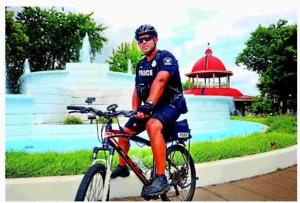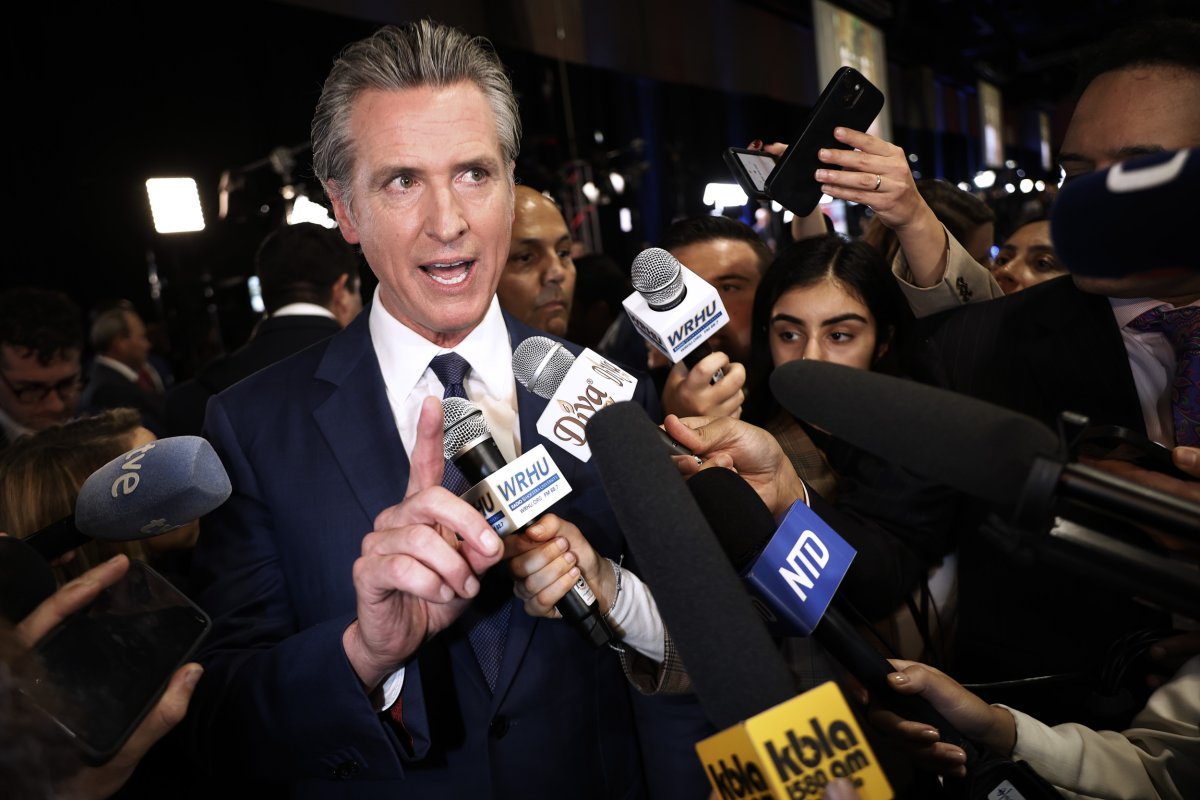
DECATUR — Josh Davis, one of the Decatur Police Department officers who takes part in bicycle patrols, is busy explaining the advantages of being out and about with the wind in your hair and the risk of bugs in your teeth. "You're more in touch with what is going on," he tells the Herald & Review while we chat outside the Transfer House in downtown Decatur's cozy Central Park. At this point we're interrupted by shouts from city of Decatur equipment operator T.
J. Murray. He dashes past yelling at a man who has decided that he really needs to take a bath in the Central Park fountain, and has climbed in.

"Hey, get out of the fountain ...
" cries Murray, a dedicated worker who always keeps a wary eye on the fountain and tries to make sure its flowing waters stay pristine. Davis watches all this unfold for a few seconds before turning back to his newspaper interviewer. "You mind if I.
..?" he asks and then with a flurry of quick pedal pumps on his sleek and black and 24-speed bike, is suddenly double-parked alongside the impromptu bather for a little law enforcement chat.
No tickets, nothing heavy. Just a meaningfully uniform word in the ear and the still glistening man, who was at least wearing shorts, is out of the fountain and free to go about his soggy day. RAPID REACTION "I'm surprised he did that with me being right here," said the 45-year-old officer, who also said a rising homeless population with issues of mental illness and other societal ills requires a watchful but not necessarily too heavy-handed policing approach to keeping life downtown on an even keel.
"Now, if we're in a squad car, it could take us 10 minutes just to get here," he added. "And on a bike you are not surrounded by that squad car, you are not attached to that computer. It's a more personable, more proactive approach to policing and you are more in touch with what is going on and the people in your community.
And you're more approachable." He gets no argument from Murray, 33, who thanks the officer for his timely intervention and tells the Herald & Review he likes the availability of cops on bikes. "It's a nice idea," Murray said.
"I think it makes a difference." As a law enforcement species, bike cops date back to the days when bicycles and horses were the only ways officers had to get around outside of walking their beats. Officers in Illinois were among the early adopters, riding primitive bikes nicknamed "boneshakers" as early as 1869.
Brave cops in Boston, Massachusetts, even hit their cobbled streets astride those bicycles with the giant front wheel and tiny back wheel known as penny-farthings in the 1880s. But the rise of the gasoline engine in automobile and motorcycle formulations put pedal to the metal and soon arrested the popularity of human-powered bikes on the front lines of law enforcement. Their subsequent revival was sparked, in part, by the realization that getting around traffic-choked streets on a bicycle was becoming so much easier, especially over short distances.
Deputy Police Chief Ed Hurst, in charge of patrol for the Decatur Police Department, said the history of modern bike patrols in the city dates back at least 26 years. Officers accepted for the department's bike unit have to take special training that takes most of a week and teaches how to handle police bikes in all kinds of situations. "It puts you in some scenarios you normally wouldn't do on a bicycle — like riding down flights of stairs," said Hurst, himself a qualified bike cop.
"And we've just put 10 officers through bike school and so we now have 40 officers who are certified bike patrol officers." These are cops who still work from squad cars but will often do bike patrols in addition to their regular duties. Hurst said that can be street patrols in areas of high pedestrian traffic like downtown Decatur or deployed for special situations in need of a softly-softly approach.
"It's great for covert operations where we can use officers to get to a certain spot to monitor criminal activity from a distance, which is a lot easier than being in a squad car," Hurst explained. He said the reaction of those protected and served by bike cops is overwhelmingly positive. "It's one step up from foot patrol but the officers are approachable and they can get where they are needed quickly,' he added.
"The public loves it." FLEET OF FOOT And talking of foot patrol, who better to ask about the impact of bike cops working the streets than one of downtown's oldest businesses? Raupp's Shoes is a shoe store that has stood at 139 N. Water St.
, just across the road from Central Park, since 1909. "We really appreciate them, we really do," said owner Linda Brilley, 76, the great-great granddaughter of the store's founder. "We see them riding their bikes all the time downtown and I think the bikes are great because they can get around to a lot more places around here a lot quicker.
And I guess the customers notice them, too, and I think it might help them feel safer." Officer Davis, having sorted out the Central Park fountain incursion, is getting ready to move off and on to the rest of his patrol. His next stop might be confronting a drug dealer or stopping a dangerous person from trying to hurt someone else; edgy variety is the constant spice of the copper's life.
Davis describes the job — whether in a squad car, on foot or on a bike — as a profession where you just don't know what's coming next, and the 45-year-old father of three boys said there is never any shortage of both challenge, risk and reward awaiting him out there on the streets. "And I would definitely say there is just a feeling of satisfaction you get from knowing you made a difference and you have done your part to make your community a little safer," he said. "You're doing something a lot of people don't have the ability to do and, yes, there is a lot of satisfaction, and pride, in being able to do that.
" contact Tony Reid at (217) 4217977. Follow him on twitter: @ tonyJreid.










